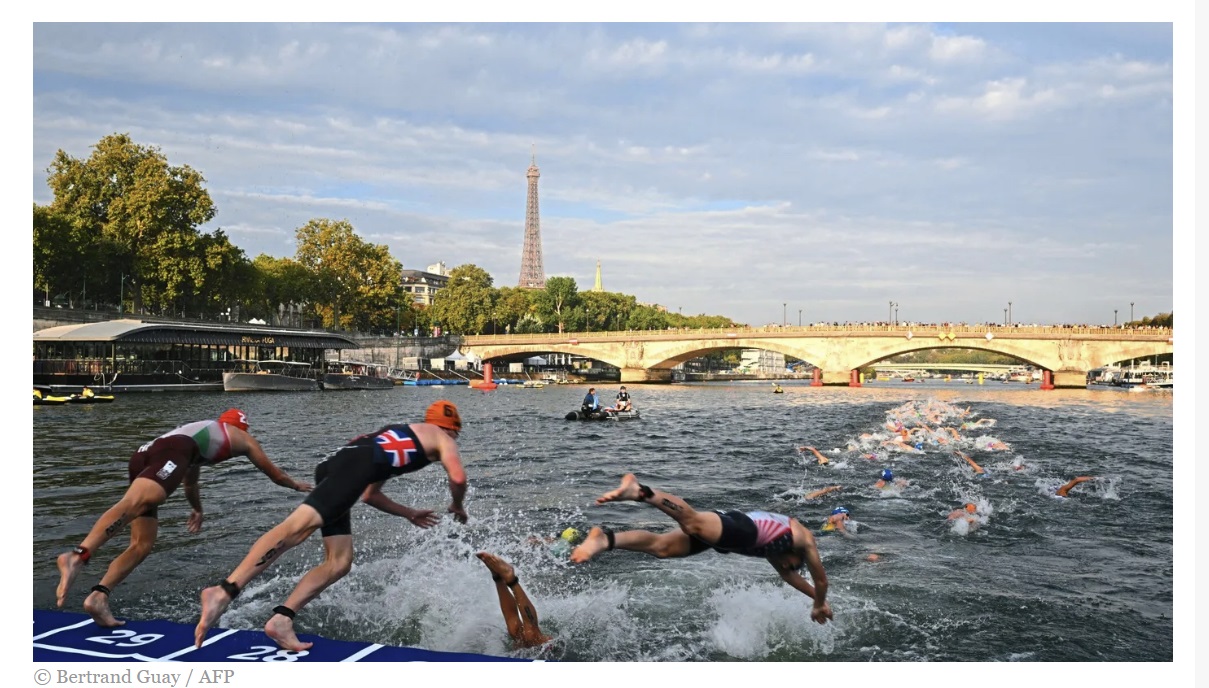
As the countdown to the Olympics on July 26 continues, the anticipation among marathon swimmers and triathletes grows, eagerly awaiting the chance to immerse themselves in the rejuvenated waters. Their excitement underscores a significant juncture in Paris's endeavor to restore the Seine River to its former splendor.
Amidst the mounting anticipation for the forthcoming Olympics in Paris, the city's focus extends beyond the construction of iconic stadiums to include a groundbreaking, yet potentially overlooked, initiative. Concealed beneath the city's thoroughfares lies a $1.5 billion subterranean tunnel and water tank, meticulously crafted to elevate the Seine River into a premier venue for the triathlon and marathon swim races. This ambitious endeavor underscores Paris's dedication to hosting truly extraordinary Olympic events while concurrently rejuvenating the Seine. Notably, the river will play a prominent role in the Olympic proceedings, serving as the focal point for events such as marathon swimming and the triathlon. Additionally, the opening ceremony promises to captivate spectators, as athletes will traverse the Seine on a flotilla of boats, offering a unique spectacle against the backdrop of renowned landmarks like the Eiffel Tower and Notre-Dame Cathedral.
The motivation behind this extensive project is not only the upcoming Olympics but also a long-term vision to restore the Seine's health and usability. Swimming in the river has been banned since 1923 due to pollution, but the cleanup aims to change this. Daily water quality samples taken last summer showed that 90% of the water in designated swimming areas was clean enough for safe swimming. A key component of the cleanup is the construction of a large reservoir near the Austerlitz train station, designed to capture excess rainwater and prevent untreated wastewater from entering the river. This facility can hold the equivalent of 20 Olympic swimming pools of water, ensuring it is treated before being released back into the Seine. Additionally, the project includes the improvement of sewage treatment plants along the Seine and its tributary, the Marne. Laws have also been changed to require moored boats to connect to Paris' sewage network instead of discharging directly into the river. This is especially important given that last August, heavy rains overwhelmed Paris's old sewer system, causing the cancellation of some Olympic test events.
This project has already shown promising results, with an increase in biodiversity and cleaner water. It is seen as an inspiration for other cities aiming to reclaim their waterways and improve urban water management. As the Olympics approach, officials remain optimistic. "No reasons to doubt,” International Olympic Committee executive Christophe Dubi said Thursday at an online briefing after hearing from city officials and Summer Games organizers. “We are confident that we will swim in the Seine this summer.”

In a bold move to instill confidence in the Seine's improved water quality, Mayor of Paris, Anne Hidalgo, has confirmed her intention to fulfill her promise to swim in the Seine come mid-July. Emphasizing her trust in the river's safety, the Mayor has extended an open invitation to French President Emmanuel Macron to join her in this significant and symbolic gesture. This public demonstration not only underscores the city's unwavering commitment to the thorough cleanup efforts of the Seine but also provides assurance to both citizens and athletes. Notably, Hidalgo's action marks a departure from the unfulfilled promise made by former President of France and Mayor of Paris, Jacques Chirac, in 1990 to swim in the Seine, amplifying the significance of Hidalgo's commitment.
Parisians will have the opportunity to swim in the Seine after the Olympic Games, with plans for the river to be open for bathing by 2025. This initiative aims to transform the Seine into a safe and enjoyable recreational space, enhancing the city's appeal and providing residents with a new way to experience their iconic river.
In conclusion, the successful transformation of the Seine River to meet the rigorous standards for Olympic swimming events stands as a notable triumph in urban environmental restoration. The concerted cleanup endeavors, implementation of state-of-the-art technologies, and unwavering dedication to enhancing water quality have not only revitalized the Seine but also paved the way for sustainable urban water management practices. Furthermore, as further evidence of progress, Paris City Hall will open the Canal Saint-Martin for bathing this summer, continuing the initiative from last year. As the Seine's revival holds the promise of making swimming in its waters a viable prospect once again, the lingering question emerges: would you swim in the Seine?
Office hours:
Tuesdays 2-6pm
Thursdays 10am-2pm
Library:
Saturdays 10am-12pm
Alliance Française Silicon Valley
Los Gatos, CA 95032
Leave a Comment